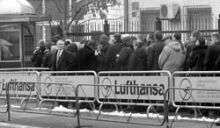When the Ukraine-European Union talks on relaxing visa requirements are completed, some categories of Ukrainian citizens will be eligible to receive free or long-term visas, the Ambassador Extraordinary and Plenipotentiary of Germany, Dietmar Stuedemann, told journalists. “In any case, a student will have to prove that a university place has been reserved for him and his stay has been duly financed. Journalists will have to prove that they have been accredited and their media really exist. Entrepreneurs will have to submit proof that their businesses exist and function,” the ambassador noted. “To this end, we will be doing some screening procedures, and only after it is proven that the applicant is really the person s/he claims to be, a decision will be made whether to grant them a long-term or free visa, how soon it will be issued, and so on.” The ambassador noted that a relaxed visa regime between the EU and Ukraine will not essentially reduce the workload of visa section employees at the German embassy: there may be fewer applications for long- term visas.
Last week Ukrainian journalists had an opportunity to see how the German embassy’s visa section works. Last year the section issued about 122,000 visas and turned down about 17 percent of applications. In the first 11 months of this year, 109,000 visas were issued and the rejection rate was 9.5 percent. “The most frequent reasons for denying a visa are insufficient roots in Ukraine or incorrect information about the purpose of a visit,” said visa section chief Sielke Ennewein.
Ambassador Stuedemann is saddened by allegations that Germans do not want to welcome Ukrainians. “Statistics say that this is not so: Germany is the Schengen Agreement country that issues the largest numbers of visas in Ukraine. Therefore, Germany is first of all an attractive country for Ukrainians, and second, we are willing to see them in our country,” the ambassador said. The recent “visa scandal” in Germany called Berlin’s attitude into question: the opposition, which is now in power, accused the red-green government that its liberal policies had opened the door to illegal migrants from Eastern Europe, primarily from Ukraine.
Later, German officials said this was just the opposition’s attempt to “eat up” then Foreign Minister Joschka Fischer. But this “domestic quarrel” also caused an international ripple. Stuedemann says that the scandal signaled “the need to adopt a more careful approach to document examination.” “There was not a single investigation of our visa section: we merely testified as witnesses, shared our experience, and gave advice,” he pointed out.
“You don’t need to have a 500-dollar monthly salary: if it is proved that the hosting person will provide for your stay in Germany, you will receive a visa,” the ambassador assured us. He cited the stereotypical speech of a Ukrainian MP, who said in parliament that “Ukrainian blondes aged 21 will never be given a German visa.” Afterwards, the parliamentarian offered an apology.
“Very often we hear complaints that it is very difficult to get a visa for Germany, but at the same time we seldom see reports about criminals who surround the visa section and the difficulties they create for us,” said the ambassador. He says that it is the activity of these shysters, which leads to the spread of negative stereotypes about consular services. The point is that criminal elements are struggling for survival by trying to persuade people that they will never get a visa without their “help.” These frauds, who forge visas, letters of invitation, documents, and all kinds of employment records are spreading rumors about “bad foreign bureaucrats.” Naturally, we turn to Ukrainian law- enforcement bodies to expose and eradicate these elements because only Ukrainian law enforcers are authorized to intervene,” Stuedemann said, “but the very fact that the criminal underground still exists means that it is well-developed, and Ukrainian agencies are finding it extremely difficult to combat.”
Serious as the problem is, there are also funny incidents. For example, sometimes people who are trying to confirm the identity of the person who allegedly sent them an invitation produce a photomontage. “The most interesting thing is when a photo shows two persons: one is casting a shadow and the other isn’t,” visa section employees laugh.
On a serious note, they gave us some useful pieces of advice:
1. You can find a list of required documents and a description of the application procedure on the embassy’s Web site www.german-embassy.kiev.ua.
2. An applicant or his representative (without power of attorney) can make an appointment for an interview by e-mail or in person.
3. A visa costs 35 euros for adults and 17.5 euros for minors. The embassy charges no other fees.
4. You should be truthful to visa section employees. You should not give in to the provocation of frauds because they will cheat not only the consulate but you too.







